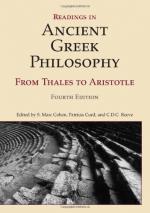|
This section contains 996 words (approx. 4 pages at 300 words per page) |

|
Thales of Miletus is widely depicted in ancient sources as a pioneering rationalist and the founding father of Greek philosophy, science, and mathematics. Famous for ingenuity in many areas, he was also numbered among the seven sages (Sophoi or wise men). Evidence for his life and thought is meager and often questionable. Although written work is attested, nothing survives and he probably wrote nothing (Greek script still had limited uses). The earliest extant reports come from the historian Herodotus (c. 484–between 430 and 420 BCE); other evidence derives largely from Aristotle and his younger colleagues, Theophrastus and Eudemus (fourth century BCE). Hence, the reliability of the evidence depends heavily on the accuracy of the information available to them. Their testimony has been challenged by many scholars. But recent studies afford grounds for confidence, in part by tracing how Thales' ideas...
|
This section contains 996 words (approx. 4 pages at 300 words per page) |

|


